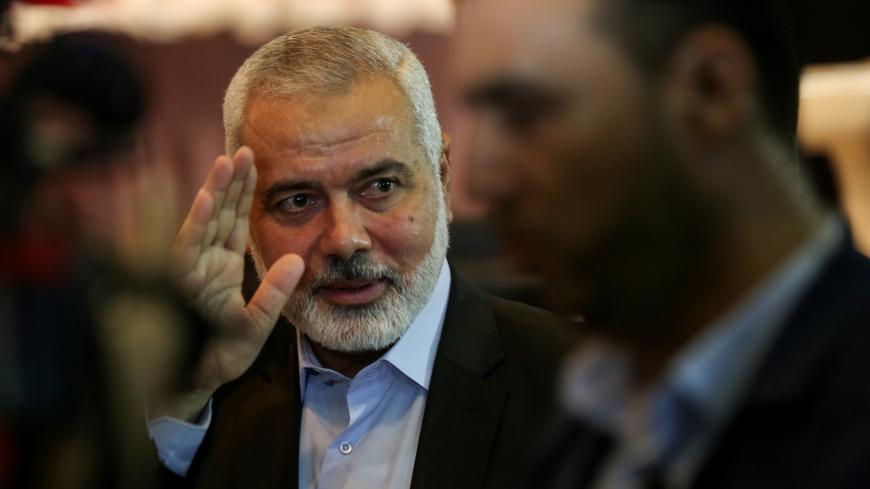Palestinians leaders in the West Bank and in Gaza paid close attention to the Israeli elections held Sept. 17, but not so much as an internal Israeli matter than as an event that will affect Palestinian lives. Hamas issued a series of responses before and after announcement of the results, signaling anticipation of possible impacts to the security, political and economic situations in Gaza, in particular the future of the Qatari-Egyptian and UN-mediated indirect understandings reached between Hamas and Israel since November 2018.
In November 2018, Hamas along with its allied factions — Islamic Jihad, the Popular Front for the Liberation of Palestine and the Democratic Front for the Liberation of Palestine — reached a series of humanitarian understandings with Israel brokered by Egypt, Qatar and the United Nations. Accordingly, Hamas would lower the temperature of the weekly protest marches along the Gaza-Israel border that began in March 2018, and Israel would ease restrictions on Gaza, including extending the fishing zone off the coast and reopening land crossings to goods and people. In addition, Qatar would be allowed to provide monthly stipends to assist poor families in Gaza, fund a power plant and other infrastructure projects in Gaza and support projects to provide 30,000 jobs for university graduates.
As for a potential change in government in Israel, Hamas spokesperson Hazem Qassem told Al-Monitor, “The Israeli elections had the competing Israeli political parties incite for aggression against Gaza, annexation of the West Bank and desecration of Al-Aqsa Mosque. Hamas does not care that this or that party in Israel is the one that will triumph over the other.” For emphasis, he explained, “Netanyahu himself staged wars against us, and his rival, Blue and White Party chairman Gen. Benny Gantz, led a war against Gaza in 2014. For us, they are the same when it comes to aggression against Gaza.”
Qassem further stated, “The understandings were reached between the Palestinian factions and the occupation state via Egyptian mediation. They were not signed with the Likud Party. Regardless of who is going to lead Israel following the elections, Hamas will continue to use all means to break the siege on the Gaza Strip.”
Asserting that it makes no difference to Hamas which candidate prevails could be an attempt to create the impression that the movement does not differentiate between Israeli partisans, but this belies the political reality. Of note, Hamas concluded cease-fire agreements in 2018 and a prisoner swap deal in 2011 with a right-wing Israeli government. Hamas is well aware that a convergence of mutual interests between foes is possible.
Of particular note in this regard, Hamas has not been willing to cede control over Gaza, despite a variety of pressures from the Palestinian Authority (PA) to do so, and the Likud has not pressed for the restoration of PA control over the enclave either. For this reason, PA affiliates have branded Hamas as preferring Likud to come out on top in the elections.
Ashraf al-Ajrami, a former PA prisoner affairs minister, wrote in Sept. 18 in Al-Ayyam that Netanyahu forming a cabinet with the extreme right will result in a softer policy toward Gaza, given Netanyahu's willingness to preserve Hamas rule in there. Thus, although Hamas has not gotten everything it wants from the understandings, it is still okay with Netanyahu because he has let them remain in power. In contrast, in the event Gantz forms the next government, Israel would be more likely to go to war against Gaza to topple Hamas.
Said Bisharat, editor in chief of Hudhud News, which focuses on Israeli affairs, told Al-Monitor, “The future of the understandings between Hamas and Israel depends on how serious and keen the mediators are on resolving the problem of the siege against Gaza. In the case that an Israeli government of national unity is formed, things will remain the same when it comes to the understandings, ranging between full implementation or foot-dragging in carrying them out at times.”
Alternatively, Bisharat remarked, “In the case a government is formed unilaterally [that is, by Likud or Blue and White without the other], the party forming it will find it hard to turn a deaf ear to the understandings, given the regional and international sponsorship of said understandings. Their implementation will, however, be slow.”
It is no secret that Hamas is concerned about the future Israeli government complying with the understandings, and in fact it hopes to enhance them. The movement perhaps believes that compliance and even enhancement are possible if the same right-wing ruling coalition returns to power.
Nevertheless, there are two options should Blue and White form a government without Likud: either the page will be turned on the understandings, forcing Hamas to adopt a different policy toward the new government amid trying economic conditions in Gaza, or the new government and Hamas will move forward with the understandings given the regional and UN sponsorships.
Mohammad Abu Jyad, editor in chief of Eqtisadiya in Gaza, told Al-Monitor, “Hamas would rather that Netanyahu win the election, in the hope that he will implement the understandings.… The generals of the Blue and White will deal with Gaza based on military and security directives, which increases Hamas’ fear about the future of the understandings.”
Abu Jyad further asserted, “According to expectations within Hamas, there are no prospects for lifting the siege and easing economic measures against Gaza. Also, Gazan businessmen do not see that there are good chances for an economic opening with Israel because of the Israeli election results [with the Blue and White ahead]. There might be no prospects for a better economic reality in Gaza, and [the results] could affect the [fate of the] monthly Qatari funds distributed to the poor families as a part of the understandings.”
While initial impressions within Hamas were pessimistic about continued implementation of the understandings should Blue and White form the government, there is still some hope that such a government might further advance the understandings.
What makes Hamas' hypothesis of moving forward under Blue and White a possibility is that the Israeli army and security agency leaders close to the generals heading Blue and White are convinced that a resolution to the Gaza problem is linked to finding economic pathways to improve living conditions while reserving security and military options.








